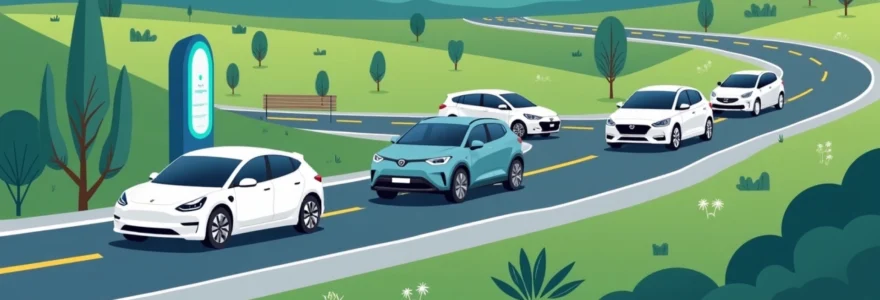As the world shifts towards sustainable transportation, electric vehicles (EVs) are becoming increasingly popular for both daily commutes and holiday travel. The allure of zero-emission driving combined with cutting-edge technology has many travellers considering EV rentals for their next vacation. But is renting an electric car truly practical for your holiday plans? Let’s dive into the world of EV rentals and explore the factors that could make or break your electrified holiday experience.
EV charging infrastructure for holiday travel
One of the primary concerns for anyone considering an electric car rental for their holiday is the availability and reliability of charging infrastructure. The good news is that the UK has been rapidly expanding its network of charging stations, with over 30,000 public charge points now available across the country. However, the distribution of these charging points is not uniform, and some popular holiday destinations may have better coverage than others.
When planning your EV holiday, it’s crucial to research the charging options along your route and at your destination. Many motorway service areas now feature rapid charging stations, allowing you to top up your battery quickly during longer journeys. Additionally, an increasing number of hotels, restaurants, and tourist attractions are installing charging points to cater to EV drivers.
To make the most of the available infrastructure, consider using specialized EV charging apps like Zap-Map or PlugShare . These tools can help you locate nearby charging stations, check their availability in real-time, and plan your route accordingly. It’s also worth noting that some EV rental companies provide access to specific charging networks as part of their service, which can simplify the charging process during your holiday.
Range analysis of popular electric rental models
When it comes to electric car rentals, the range of the vehicle is a crucial factor in determining its practicality for your holiday. Let’s examine some popular EV models commonly available for rent and their respective ranges:
Tesla model 3 long range performance
The Tesla Model 3 Long Range Performance is a favourite among EV enthusiasts and offers an impressive WLTP range of up to 360 miles on a single charge. This makes it an excellent choice for longer road trips and multi-day excursions. With its extensive range and access to Tesla’s Supercharger network, range anxiety becomes less of a concern for most holiday travellers.
Nissan leaf e+ tekna
The Nissan Leaf e+ Tekna, with its 62 kWh battery, provides a WLTP range of up to 239 miles. While not as extensive as the Tesla, this range is still sufficient for many holiday trips, especially if you’re planning to stay within a specific region or make frequent stops along your journey.
Volkswagen ID.4 pro performance
The Volkswagen ID.4 Pro Performance boasts a WLTP range of up to 322 miles, positioning it as a strong contender for holiday rentals. Its spacious interior and ample boot space make it well-suited for family vacations or trips requiring extra luggage capacity.
Hyundai kona electric ultimate
With a WLTP range of up to 300 miles, the Hyundai Kona Electric Ultimate offers a good balance of range and practicality. Its compact size makes it suitable for both urban exploration and countryside adventures, providing flexibility for various holiday scenarios.
When selecting an EV rental for your holiday, consider not only the stated range but also factors such as driving conditions, weather, and your planned activities. It’s generally advisable to choose a model with a range that comfortably exceeds your expected daily mileage to account for any unforeseen circumstances or detours.
Cost comparison: EV vs ICE rentals for holidays
Understanding the cost implications of renting an electric vehicle versus a traditional internal combustion engine (ICE) car is crucial for holiday planning. Let’s break down the various factors that contribute to the overall cost of your rental:
Initial rental fees and deposits
Generally, the base rental rates for electric vehicles tend to be higher than those for comparable ICE models. This premium reflects the higher purchase price of EVs and their relatively limited availability in rental fleets. However, as EVs become more prevalent, this price gap is expected to narrow.
Deposits for EV rentals may also be higher, as rental companies aim to protect their investment in these high-value vehicles. Be prepared to have a larger hold placed on your credit card when renting an electric car.
Charging costs vs fuel expenses
One of the most significant advantages of renting an EV for your holiday is the potential for lower “fuel” costs. Charging an electric vehicle is generally cheaper than filling up a petrol or diesel car, especially if you can take advantage of free or low-cost charging options at your accommodation or tourist destinations.
To illustrate the potential savings, consider this comparison:
| Vehicle Type | Cost per 100 miles |
|---|---|
| Electric Vehicle (home charging) | £4 – £6 |
| Electric Vehicle (public rapid charging) | £8 – £12 |
| Petrol Car (average efficiency) | £12 – £18 |
| Diesel Car (average efficiency) | £10 – £15 |
Keep in mind that these figures can vary based on current energy and fuel prices, as well as the specific efficiency of the rental vehicle.
Insurance and liability considerations
Insurance costs for EV rentals are often comparable to those for ICE vehicles. However, some rental companies may charge a slight premium due to the higher value of electric cars. It’s essential to carefully review the insurance options provided and consider additional coverage if needed, especially for longer trips or travels to remote areas.
Hidden fees and surcharges
When renting an EV, be aware of potential hidden fees that may not apply to traditional car rentals. These could include:
- Charging cable replacement fees
- Low battery return charges
- Premium parking fees for EV-specific spaces
- Additional driver surcharges for EV-specific training
Always read the rental agreement carefully and ask about any EV-specific charges or requirements before finalizing your booking.
Ev-friendly holiday destinations in the UK
Choosing the right destination can significantly enhance your EV holiday experience. Let’s explore some UK locations that have embraced electric vehicle tourism:
Lake district national park’s charging network
The Lake District National Park has made significant strides in becoming EV-friendly, with a growing network of charging points scattered throughout the region. Many popular attractions, hotels, and car parks now offer EV charging facilities, making it easier for electric car renters to explore this beautiful area without range anxiety.
The park’s commitment to sustainability aligns perfectly with the ethos of electric vehicle travel, allowing you to enjoy the stunning landscapes while minimizing your environmental impact. Popular spots like Windermere, Keswick, and Ambleside are well-equipped to cater to EV drivers, with a mix of fast and rapid chargers available.
Cornwall’s sustainable tourism initiative
Cornwall has been proactive in promoting sustainable tourism, including the development of an extensive EV charging infrastructure. The county boasts a growing network of charging points at key locations, including beaches, towns, and major tourist attractions.
Many Cornish hotels and holiday cottages now offer on-site EV charging, making it convenient for visitors to top up their batteries overnight. Popular destinations like St Ives, Newquay, and the Eden Project have embraced EV technology, ensuring that your electric car rental won’t limit your exploration of this picturesque coastal region.
Scottish highlands’ electric highway
The Scottish Highlands may seem like a challenging destination for EV rentals, but significant progress has been made to create an “Electric Highway” throughout the region. This initiative has led to the installation of rapid charging points along major routes, making it possible to explore the rugged beauty of the Highlands in an electric vehicle.
Key tourist areas like Loch Ness, Glencoe, and the Isle of Skye now have charging infrastructure in place, allowing EV drivers to venture further into this spectacular landscape. While planning is still crucial for longer trips in the Highlands, the growing charging network has made electric car holidays in this region increasingly viable.
Planning your EV holiday itinerary
Crafting the perfect itinerary for your EV holiday requires a bit more forethought than a traditional road trip, but with careful planning, it can be just as enjoyable and even more rewarding. Here are some key considerations:
Route optimization with EV-Specific GPS apps
Utilize EV-specific navigation apps like A Better Routeplanner or EV Trip Planner to optimize your journey. These tools take into account your vehicle’s range, charging stops, and even factors like elevation changes to create the most efficient route for your electric car rental.
When planning your route, consider:
- The location and availability of charging stations along your path
- The charging speed of available stations (rapid chargers vs. slower options)
- Alternative routes in case of unexpected closures or busy charging points
- Scenic detours that align with your vehicle’s range and charging opportunities
Integrating charging stops into sightseeing plans
Turn potential charging time into an opportunity to enhance your holiday experience. Look for charging stations located near points of interest, restaurants, or shopping areas. This way, you can make the most of your time while your EV is replenishing its battery.
For example, if you’re visiting the Lake District, you might plan a charging stop at the Rheged Centre near Penrith, which offers rapid chargers alongside its exhibitions, cinema, and cafes. Similarly, in Cornwall, you could schedule a charge while exploring the iconic Eden Project, which provides EV charging facilities for visitors.
Accommodations with EV charging facilities
Choosing accommodations with on-site EV charging can greatly simplify your holiday logistics. Many hotels, B&Bs, and holiday rentals now offer this amenity, allowing you to charge your vehicle overnight and start each day with a full battery.
When booking your stay, look for properties that specifically mention EV charging facilities. Some booking platforms even allow you to filter accommodations based on this feature. Remember to inquire about any associated costs for charging, as policies can vary between properties.
Overcoming EV range anxiety on holiday
Range anxiety – the fear of running out of battery power before reaching your destination or a charging point – is a common concern for those new to EV driving. However, with proper planning and a few practical strategies, you can enjoy your electric car rental holiday with confidence.
Emergency charging options and roadside assistance
While it’s unlikely you’ll completely run out of charge if you’ve planned your trip carefully, it’s reassuring to know that emergency options exist. Many EV rental companies offer roadside assistance specifically tailored to electric vehicles, which can include mobile charging services or towing to the nearest charging station.
Additionally, consider carrying a portable EV charger as a backup. These devices can provide a small amount of charge in emergencies, potentially giving you enough range to reach the nearest charging point.
Battery management techniques for long journeys
Maximizing your EV’s range on long journeys requires a combination of smart driving techniques and effective battery management. Consider these tips:
- Utilize regenerative braking to recapture energy during deceleration
- Maintain a steady speed and avoid rapid acceleration or braking
- Use climate control efficiently by pre-conditioning the car while it’s still charging
- Pack light to reduce the vehicle’s weight and improve efficiency
- Plan your charging stops to keep the battery between 20% and 80% for optimal longevity and charging speed
Adapting driving habits for maximum efficiency
Driving an EV efficiently requires a slightly different approach compared to traditional vehicles. Focus on smooth, consistent driving rather than rapid acceleration and hard braking. Use features like eco-mode and regenerative braking to extend your range, especially in hilly or urban environments.
Pay attention to your vehicle’s energy consumption display and adjust your driving style accordingly. Many EVs provide real-time feedback on efficiency, helping you develop habits that maximize your range and reduce the frequency of charging stops.
By embracing these techniques and approaching your holiday with a well-planned itinerary, you can overcome range anxiety and fully enjoy the unique experience of exploring the UK in an electric car rental. The combination of zero-emission travel, cutting-edge technology, and the satisfaction of supporting sustainable tourism can add an exciting new dimension to your holiday adventures.


